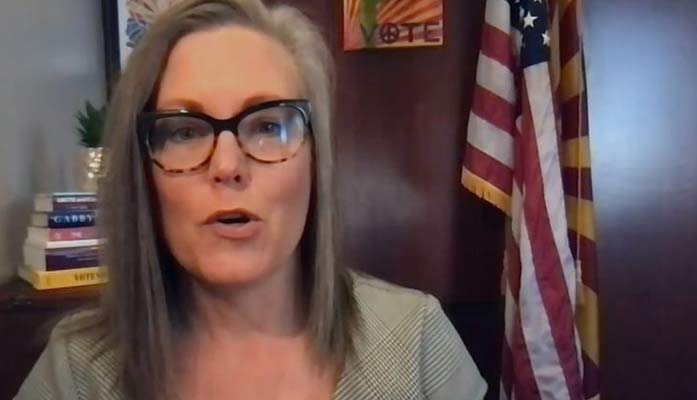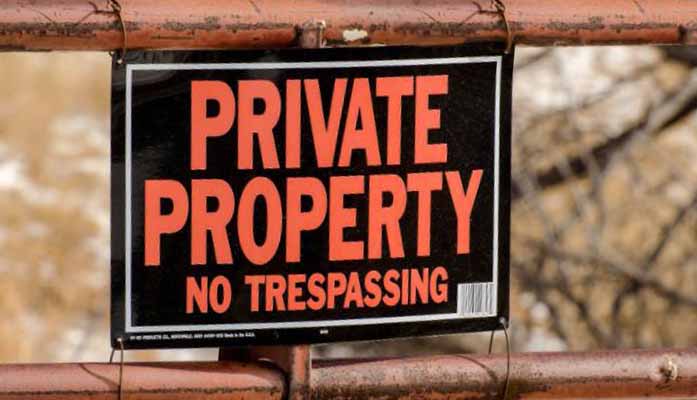
by AZ Free Enterprise Club | Sep 18, 2021 | Opinion
By the Free Enterprise Club |
It felt like we were heading this direction for quite some time. Well, here we are. Last week, President Biden made an outrageous announcement. Any employer that has 100 or more employees will be required to mandate vaccines. Not only is this a blatant abuse of power, but it ignores the fact that issues like this are supposed to be left to states.
And Arizona’s lawmakers, who were elected by the people, did address this back in July, taking keep steps to protect our state from more COVID overreach. In particular, the state legislature passed SB1819, which includes a provision that amends the ability of the state to require vaccination during a public health emergency to allow for an individual to refuse vaccination based on their personal beliefs.
But apparently, our president—or is he our king now—does not care one bit about your freedom or personal choice.
Instead, King Biden would rather maneuver around the U.S. Constitution and use the Occupational Safety and Health Administration (OSHA) to establish this ridiculous “emergency workplace safety rule.”
Remember when this was just about “flattening the curve”? It wasn’t that long ago.
And it also wasn’t that long ago when then-Senator Kamala Harris said she would not take the vaccine if President Trump mandated it. This administration can’t even get its own talking points straight. Or maybe that’s just something else they don’t care about.
But there is something they do want: to take away more of your freedoms. That’s why the Arizona Free Enterprise Club jumped into action immediately. For the past week, we’ve been urging Arizona Attorney General Mark Brnovich to sue the Biden administration. This vaccine mandate will affect more than 100 million Americans. And it is one of the most extreme infringements on both businesses and individual rights in U.S. history…
>>> READ MORE >>>

by Dr. Thomas Patterson | Sep 17, 2021 | Opinion
By Dr. Thomas Patterson |
These are fraught days for Americans. History is said to be cyclical but there is widespread concern that we are in inexorable decline.
Our leadership role in the world which seemed secure three decades ago is under serious threat. Polls show that confidence and love of country are in decline, especially among the young. Traditional American values like freedom of speech, free-market economics and responsible fiscal policy are openly attacked.
Meanwhile, e pluribus unum is facing replacement by a culture obsessed with racial identity. MLK’s dream of a society where skin color doesn’t determine our judgments of each other is now itself deemed racist.
America, though, is the longest running liberal democracy in history for a reason: our Constitution. Our great freedom document connects us to our roots, the sources of our strength. It can direct us away from hyperpartisanship toward mutual respect and agreement on shared principles – if we respect its authority.
But the Constitution has been repeatedly ignored and abused in our recent history. Many argue it is an 18th-century construct unsuited to governance in the 21st-century. Others claim it should be seen as a “living” document that means whatever someone says it means without regard to its actual content.
Since the Constitution prescribes limits on governmental powers, it particularly vexes Big Government types wishing to centralize power and enlarge their span of control. For example, a century ago President Woodrow Wilson was an early leader of the Progressive movement, which held that modern government should be guided by administrative agency experts.
Wilson thus opposed the separation of powers doctrine. He cautioned against “the error of trying to do too much by vote“, given the ignorance of the common man.
His legacy of disdain for the Constitution is reflected in today’s administrative state, in which unelected bureaucrats make binding rules (laws), direct the enforcement of those rules and adjudicate violations.
FDR later also regarded the Constitution as a problematic document requiring workarounds for him to be successful in establishing the social welfare programs and regulations thought necessary to rescue America from the Great Depression. He was so frustrated by the Supreme Court striking down his unconstitutional power grabs that he infamously tried to expand the court to15 members.
Roosevelt was temporarily rebuffed but eventually was able to secure so much of his agenda that the role of government in Americans’ everyday lives changed dramatically. Safeguards to liberty like enumerated powers and federalism suffered permanent damage.
Recent presidents have taken the constitutionally curious position that they should be permitted to exceed their normal powers when Congress won’t act as they prescribe. Barack Obama, a former constitutional law professor, correctly stated many times that he wasn’t authorized to suspend DACA deportations through executive order. There were “laws on the books“ and “I am not king“, he pointed out.
But he eventually caved, unilaterally granting work permits and legal status to first millions of illegal immigrants who entered as minors, then later to adults (later struck down). The legal fate of DACA is still pending, despite its continuing unconstitutional status.
Joe Biden used the same logic when confronted with the need for extension of the eviction moratorium passed as an emergency pandemic measure by the Trump administration. Biden acknowledged that the Supreme Court had already ruled that an extension would require congressional approval. But to appease his party’s lefties, he did it anyway, expressly ignoring the Constitution.
Donald Trump was also loathe to let the constitution interfere with what he wanted to do anyway. His most egregious transgression was pressuring Vice President Pence to reject the electoral ballots lawfully submitted by the states in the 2020 presidential election.
Pence, clearly lacking the constitutional authority to do so, refused. Fortunately, unlike previous miscreants, Trump was so thoroughly rebuked that no precedent for similar actions was created.
Part of the reason America is in trouble is because we are not protective of our Constitution, not outraged when it is abused. Judicial nominees, charged with upholding the Constitution, are vetted instead based on their political agenda.
We demean our constitution at our considerable risk. It is our bulwark against the corruption and chaos that plague impoverished nations around the world.
Dr. Thomas Patterson, former Chairman of the Goldwater Institute, is a retired emergency physician. He served as an Arizona State senator for 10 years in the 1990s, and as Majority Leader from 93-96. He is the author of Arizona’s original charter schools bill.

by AZ Free News | Sep 16, 2021 | Opinion
LOS ANGELES, Calif. — Frustrated California voters may have lost the battle to recall Democrat Gov. Gavin Newsom on Sept. 14, but the war to unseat him in 2022 is just beginning.
Multiple outlets officially called the referendum on removing the governor a failure on Tuesday night, less than one hour after polls closed. Some California residents were stunned, but others said they are determined to use the power they amassed to create the recall to keep fighting to hold the governor accountable for his tyranny.

by AZ Free Enterprise Club | Sep 15, 2021 | Opinion
By the Free Enterprise Club |
We should be doing everything we can to ensure election integrity moving forward. Too many Americans have lost faith and trust in our election system. And while the results of the last election are done, that doesn’t mean we can’t learn lessons from November 2020 and apply them going forward.
Someone should tell that to Arizona Secretary of State Katie Hobbs. Last month, Hobbs released a draft of a new elections manual. This manual establishes the election procedures that are to be used by the counties in Arizona for accepting and tabulating votes.
If approved, the manual would go into effect next year…when Democrat Katie Hobbs will be running for governor.
Problems with the elections manual
While the Arizona Free Enterprise Club is currently conducting a thorough review of the manual to identify any issues and concerns, one major problem has already arisen. In her manual, Hobbs proposes counting votes for certain offices, like president or statewide offices including governor, even if the voter shows up and votes at the wrong precinct.
But a rule like this opens the door to extensive fraud. And it’s why the United States Supreme Court ruled against this sort of thing just a couple months ago.
Do you remember that? Apparently, Katie Hobbs forgot. Or maybe she just wants to protect her own interests.
In Brnovich v. Democratic National Committee, the nation’s highest court ruled 6-3 in favor of Arizona’s ban on ballot harvesting and the state’s requirement that individuals vote in their assigned precinct for their votes to count…
>>> READ MORE >>>

by Andrew Gould | Sep 11, 2021 | Opinion
By Andrew Gould |
Our Country is based on the rule of law. From the rights and liberties protected by our Constitution to the statutes enacted by federal and state governments, we are a nation of laws. Unfortunately, the Biden administration has abandoned this principle. The most shocking example is the administration’s refusal to enforce federal immigration laws on our southern border. This dangerous “Open Border Policy” has placed the health and safety of Arizonans in grave danger. The Biden administration has reduced our southern border to a zone of lawlessness run by criminals making billions of dollars from illegal immigration — $7,000 to $8,000 per illegal immigrant. Further, these lawless crooks profit off the sale of lethal drugs such as fentanyl and methamphetamine, all the while raping women, molesting children, and assaulting and murdering thousands of victims.
We have petitioned, complained — and, at times, begged — for the federal government to help, but to no avail. The sad reality is that there is no help on the way. We are on our own.
But all is not lost. Embedded in our Constitution is the principle of federalism. Specifically, under the Tenth Amendment, powers not delegated to the federal government are reserved to the States (and the People). Federalism provides states with the power and authority to protect the safety and welfare of their citizens through new and innovative solutions without relying on the federal government.
Thus, we do not have to rely on the federal government to secure our border with Mexico. Rather, we can use state law and resources to address it on our own. We can begin securing our border by enforcing state laws that protect our citizens and their property. This can be accomplished by creating a state enforced No Trespassing Zone along the border.
The No Trespassing Zone is a simple concept. First, persons entering the country illegally must, at some point, enter private or state land. If given reasonable notice that such entry constitutes trespassing (through the posting of “No Trespassing” signs), they can, and will, be arrested for trespassing. In addition to trespass, those entering the No Trespassing Zone may be arrested and prosecuted for the criminal damage they cause to state and private property. Additionally, the trespassers and the cartels will be prosecuted for any illegal drugs and weapons they carry into the Zone.
Second, entry into the No Trespassing Zone is detected by placing a “virtual wall” along the Zone. This technology, which employs hidden cameras placed in strategic locations, provides crystal-clear, real-time images of persons entering a surveilled area. This “virtual wall” technology is already in place on the border in Cochise County and has been funded by the Arizona legislature to extend to Yuma County.
Third, the policy requires the local county attorney’s offices and the Attorney General’s office to commit to a “zero-tolerance policy” regarding violations occurring in the No Trespassing Zone. Simply put, a “zero-tolerance policy” means that these agencies will dedicate staff and resources to prosecuting crimes committed in the Zone when there is sufficient evidence to do so.
Posting no trespassing signs would, of course, require the consent of private landowners. Additionally, much of the border includes locations, such as federal and reservation land, where state law enforcement and prosecutors have no jurisdiction. Thus, in some areas, the No Trespassing Zone will have to extend inside the state to the nearest adjacent private or state property where entry is made.
It is time for Arizona to act. As Arizona’s Attorney General, I will aggressively use the power of the Office to develop creative legal strategies to solve the problems we face together. The “No Trespassing Zone” initiative will put the law on our side to ensure border security.
Andrew W. Gould was appointed as a Justice to the Arizona Supreme Court in 2017 after serving 5 years on Division One of the Arizona Court of Appeals. He retired from the Supreme Court in March 2021. Prior to his appointment to the Court of Appeals, Justice Gould spent 11 years as a Judge of the Superior Court in Yuma County, where he served as both Associate Presiding Judge and Presiding Judge.
Andrew received his J.D. from Northwestern University School of Law in 1990. He began his legal career in Phoenix, Arizona, practicing in the field of civil litigation. In 1994, he became a Deputy County Attorney, prosecuting major criminal cases for Yuma and Maricopa Counties. He served as Chief Civil Deputy for the Yuma County Attorney’s Office from 1999-2001. Justice Gould has previously served on the Arizona Supreme Court Commission on Technology, as the President of the Arizona Judges’ Association, and has taught at the Judicial Conference and New Judge Orientations.

by Rod Dreher | Sep 8, 2021 | Opinion
By Rod Dreher |
This sign of American decadence and stupidity in Afghanistan cannot be improved on. The Spectator columnist Cockburn reports on America’s attempt to turn a nation of medieval goat herders and Islamic hillbillies into penis-possessors and vulva-havers suitable for campus life at some of America’s more elite colleges. Excerpts:
So, alongside the billions for bombs went hundreds of millions for gender studies in Afghanistan. According to US government reports, $787 million was spent on gender programs in Afghanistan, but that substantially understates the actual total, since gender goals were folded into practically every undertaking America made in the country.
>>> READ MORE >>>






